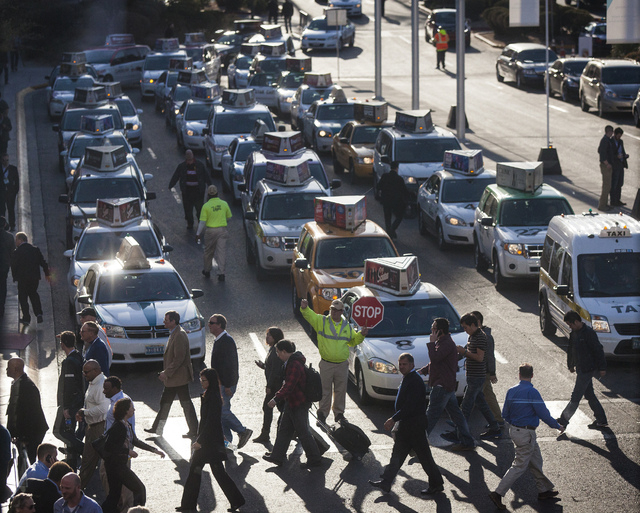Uber trouble: Taxi officials asked to crack down on illegal ridesharing

Representatives of Southern Nevada’s taxi industry on Wednesday called on the Nevada Taxicab Authority to step up efforts to impound illegally operating vehicles, specifically those associated with the ride-sharing company Uber.
Tipped that San Francisco-based Uber intends to begin operating in Southern Nevada in May, cab companies asked regulators to enforce statutes requiring a certificate of public convenience and necessity for operation.
The effort to encourage the impound of Uber vehicles was spearheaded by Yellow Checker Star, Southern Nevada’s second-largest taxi company group, but other companies also supported the effort.
Bill Shranko, chief operating officer of Yellow Checker Star, said Uber has a history of starting operations in cities without licensing, safety training or background screenings.
But a representative of Uber said the company is safe and that the taxi industry is out to protect its “poor quality service.”
“For months residents and visitors across Las Vegas have been opening the Uber app and asking us to come to town,” Uber spokesman Lane Kasselman said in response to an email inquiry.
“While the taxi industry is focused on protecting poor quality service, Uber is bringing better, safer and more reliable transportation options to communities across the country. We’re excited about the Vegas market and look forward to exploring opportunities in the future but have no plans to launch soon,” he said.
Charles Harvey, administrator of the Taxicab Authority, said regulators impound illegal vehicles and cite their drivers anytime an unlicensed vehicle is spotted. He said the authority has been monitoring Uber and he believes it is preparing to start operating in Southern Nevada because they have begun advertising for drivers on Craig’s List.
The Review-Journal reported in March that Uber and Bandwagon, a similar ride-sharing service, were attempting to build brand recognition at January’s Consumer Electronics Show.
Uber operates through a smartphone app. People needing rides request one through the app and someone with a car is dispatched to the customer’s GPS coordinates. As a result, Uber does not consider itself to be a transportation provider, but a third-party information service provider with a database of people who drive cars that have been vetted by the company. Company officials say it’s no different from getting a ride with a friend.
Cab companies disagree.
“They provide inadequate insurance coverage for their drivers who already have had major accidents with insufficient liability coverage” Shranko said. “The bullying tactics of Uber and other so-called transportation network companies are causing major risk to the traveling public and they do so with absolute impunity.”
Harvey said his agency is working with the Nevada Transportation Authority, which regulates buses and limousines, to develop a consistent approach when dealing with Uber and similar companies.
Contact reporter Richard N. Velotta at rvelotta@reviewjournal.com or 702-477-3893. Follow him on Twitter @RickVelotta.












